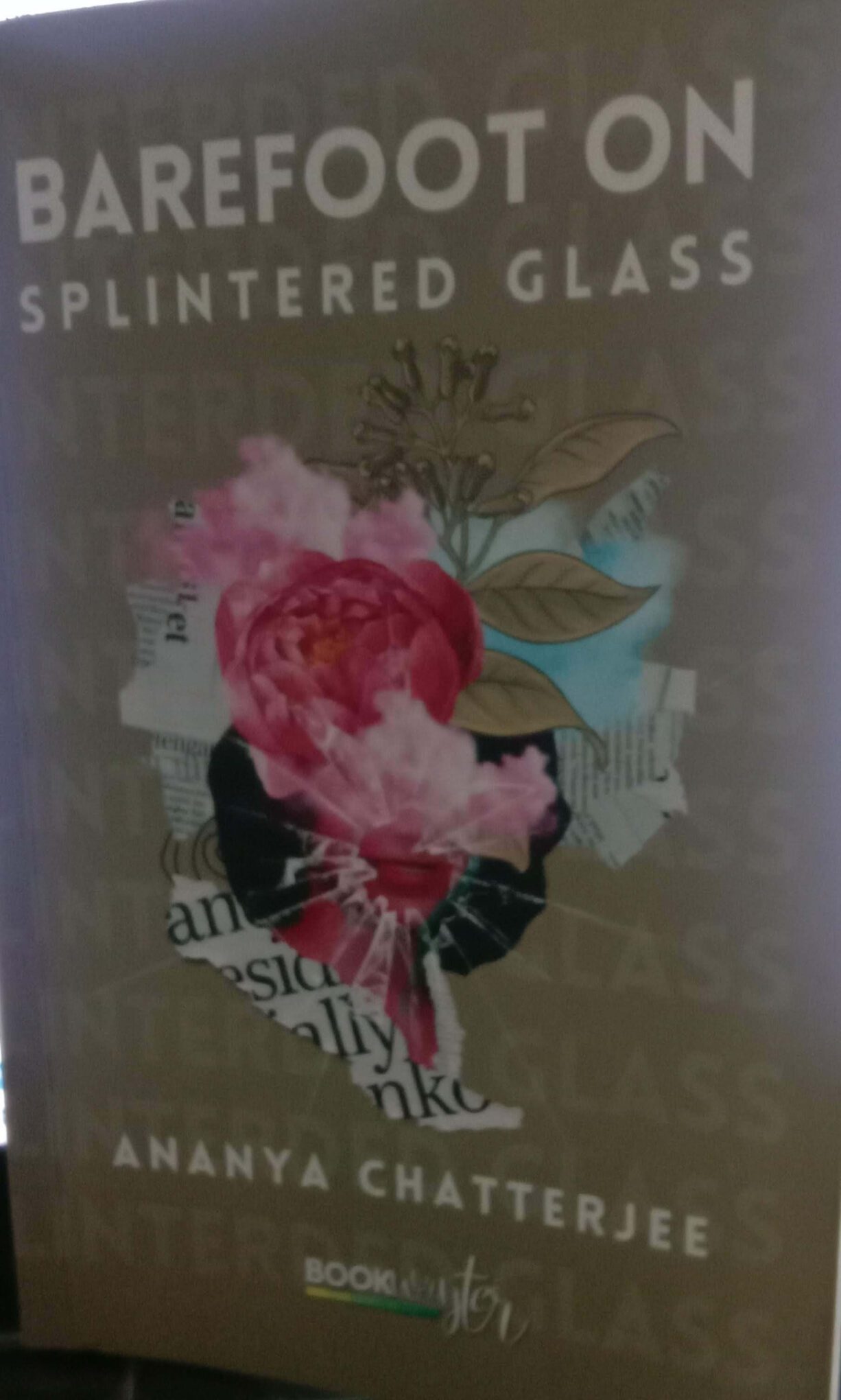Santosh reviews Barefoot on Splintered Glass by Ananya Chatterjee — exclusively for Different Truths.

In her blog, Ananya Chatterjee calls herself an ‘intuitive poet’, who has never made a conscious attempt to write; words knock at the door of her consciousness at the oddest of hours, and she relishes these words, savouring their presence in the subconscious, and then at a later period jots them down.
Through the sixty poems in this collection, I could feel myself eavesdropping into the murmurings of her inner core, absolutely gripped by the sheer power of some almost innocuous-looking poems, the twists and the sudden turns of phrases.
Ananya Chatterjee, the brilliant poet, that she is, pleads guilty to the charge of grabbing the reader by the collar, and not letting go- the irony being that the reader is in no mood to go, either!
In her poems, one finds oneself touching the contours of summer dusks, trampled flowers, nomadic birds, bizarre dreams, storms, slant-eyed lawmakers, birdless trees, smog, a solitary window, tattered and minced sky, a choking sun, and a mellowed sun. And I was yearning for more.
Exquisitely published by BookWryter, with an absolutely innovative cover designed by Linda Ashok, the book has been Dedicated to the Late Riser.
In a “Very Backward-Inward Looking Foreword”, Jayant Kriplani makes some initial tongue-in-cheek comments; and as one reads them, one can almost imagine him chuckling in self-congratulatory mirth, and one makes no effort to hide one’s own chuckles.
[“I’m not a poet and that’s a fact
I hated verse, rhymed, blank or free
Wordsworth and Keats always stymied
Any feelings I had for an ode or three
Browning and his ilk ruined it for me”]
And then he goes on to say, ‘In the early part of the century
someone introduced Ananya to me.”
Divided into four sections-Summer, Autumn, Winter and Spring, each poem speaks to the reader’s heart. Yes, it is a speaking book – a sparkling book- a book that talks to the reader, in hushed tones, oft in muted whispers of anguish, wistfulness, nostalgia and longing. One can touch her ache, feel her ecstasy, the turbulence, the fire raging inside, and empathize with her dilemmas. I found my heart beating with the inbuilt musical cadence.
Mother, the second poem in the first section is poignant; the reader is suffused in the emotions overwhelming the poet- missing that face, voice, low, wild tune- that familiar melody.
“My mindless feet dragged me back
to my phone-back to
Familiar strokes on the number pad…
to the private memory of fingertips”. [Mother, Summer, PP 10 – 11]
My mind goes back to the time when I was in Kolkata a few years back, and the moment this poet came to know that I was in town, she came to meet me straight from the airport, because I was leaving the next day. She is a poet, I have always admired; her empathy is beautifully reflected in all her poems, be it while talking about nature, tender love, old age, abandonment, the vicissitudes of life, and also about distortion.
Distortion in the third section, [Winter, P 73] is a poem, where I found myself trying to read between the lines, mulling over this multi-layered beauty. The very first line took me right into the watery depth of the poem: “I have an affinity for water-borne sickness.” The lines that followed had me completely hooked.
“There was jaundice at twelve, and typhoid at thirteen.
Then at sixteen, there was love.”
The two concluding lines:
“Some diseases kill. Some let you survive.
And some distort you into a poet for life,” left me awe-struck.
If diseases have the potential to distort one into a poet, I wouldn’t mind such a positive distortion!
This small, sleek, beautifully produced book brims with thought-stimulating topics, free from verbosity and adjectival acrobatics. A straightforward, uncluttered style, originality of thought, and stunning imagery are the hallmarks of Chatterjee’s poetry.
Some lines from this book will stay with me forever:
‘When the heart is on a high tide,
bitterness creeps to quieter corners’ [Spring, Tides, P 97]
“No addiction is warmer than abandonment.” [Spring, Abandonment, P 92]
‘Let
what flows between us stay nameless
Like wildflowers on a moth-eaten wall”.
[Spring, Nameless, P 93]
The refrain in The Forest and I in the fourth section [Spring, P 91]
“Here. Now. Untamed and free
I am the forest, the forest is me”
“dragonflies
tiptoe through a sea of subdued green.”[Spring, Gratitude P 89]
“I look back. Over my shoulders. Just in case.”
[Wishful, Summer, P 29]
“The day you left was the day you stayed on.’ [Chronicles of the Abandoned. Summer, PP 18- 20]
Listening to her sane advice, in, Go Heart Go, I also felt an irresistible urge to unbutton my insanity:
“Sail off. Break free. Go heart, go.
Go Unbutton your insanity. [Summer, PP 13-14]
“I Don’t Share My Light with Strangers’, [Winter, PP 52 -53] is another of my favourite poems. The refrain, ‘that voice reminded me of you,’ has clung to me ever since I read the poem.
So is Diagnosis [Winter, PP 54-55]. I read on, mesmerized by the powerful imagery that this poem is brimming with. ‘A mountain of emptiness in a fist-sized heart,’ is a line I kept repeating to myself. This is a poem which cries to be read aloud.
“In a world choking on leftovers,
a woman’s hunger is blasphemy”.
It was on this page that I closed the book and a litany of sighs poured forth, unchecked. I opened the book again on the same pages, [Winter, Leftovers, PP- 59- 60] to doff my hat to the poet’s deft and subtle use of words, evoking the image of a woman hurriedly finishing her meal- and much more.
As I finally closed the book, like the poet, I set my heart free, feeling it escape to the land of that elusive freedom,
“I set her free. Each night. Nevertheless.
She’s not the one to be tethered
to the bedpost of my loneliness.” [Night Prowler, Spring, PP 84- 85], and like the blackbird in her poem, I felt that I had claimed ‘the hungry sky.’ [Summer, The Flight, P 12]
I could feel the bruises she talks about, bleeding me, making me wince and almost cry out in pain. But it was a cathartic process- and in the process, I found myself healed. Rejuvenated.
Here is a poet you want to read again and again.
And then some more.
By the way, following Jayant Kriplani’s suggestions, I kept the ‘book on the bedside table.’
And, the rest needs no repetition: I am still glowing.
Picture of book cover by reviewer





 By
By
 By
By
 By
By
 By
By